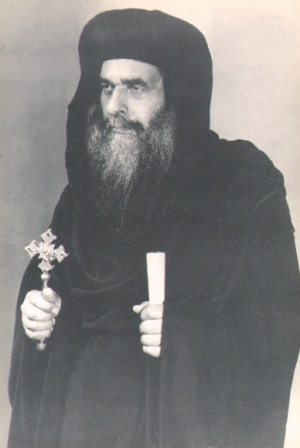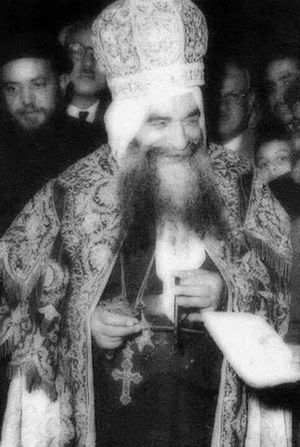Cyril VI (Atta) of Alexandria
| Note: This article or section represents an Oriental Orthodox (Non-Chalcedonian) perspective, which may differ from an Eastern Orthodox (Chalcedonian) understanding. |
His Holiness Pope Cyril VI (Atta) of Alexandria (also transliterated Kyrellos, Kyrillos, or Kirellos), born Azer Ioseph Atta (August 2, 1902 – March 9, 1971), was Coptic Orthodox Pope from 1959 to 1971. Pope Kyrillos was one of the greatest popes, patriarchs and ascetics in Orthodoxy. He was a wonder-working saint with gifts of healing, exorcising demons clairvoyance, clairaudience, and prophecy, as well as the gifts of those that the coptic church designate as “anchorites” namely the gifts of agility (instantaneously travelling/teleporting to far places), and that of bilocation (being at two places at the same time). He was a world class ascetic who survived only on a piece of prosphora (unconsecrated communion bread), a cup of espresso coffee and a glass of water during lent. A great revival of monasticism and an expansion of church-building inside and outside of Egypt took place in his episcopacy. He continues to work miracles to this day (more than 40 years after his death), and was canonized in the Coptic Church in 2013.
Life
Pope Cyril VI was born in Damanhour, Egypt, into a Christian family, with a loving parents that instilled in their children the love of God and his saints. Their house always invited blessed monks to come and stay with them.
Early Years
One of the monks who often visited them was Father Tadros El-Baramousi (the monastery of St Moses the Black in Natroon Valley), who had weak eyes due to his advanced age. He travelled around the country collecting tithes for the Baramous Monastery. Azer, though not yet four years old, found comfort in the old man's company and enjoyed looking at his beard. One night Azer fell asleep on the monk's lap. His mother apologized, rushing to carry the boy. The elderly monk stopped her by saying, "Let him sleep here, because he is of our share; he is one of us."
The day before The Holy Lent, some Coptic families serve a large variety of rich foods called رفاع (pronounced rifaa' which literally means 'lifting up' of animal products, before fasting, that is). Azer protested against the lavishly set dining room table. He said, "Why should we have an overabundance of food, while others have only plain bread?" Azer suggested to his mom to give the food to a poor Muslim neighbor family who had no income.
Due to Azer's love for the bible, Azer was able to memorize the gospel of John when he was still in grade school.
After Azer finished high school, he joined a shipping company. One day Azer was in charge of handling the customs clearance of the belongings of an important English captain returning to England. That captain misplaced a wallet with a huge sum of money and documents of critical importance. Azer found it and returned it. He refused a hundred sterling pound reward, a huge fortune at that time.
Azer's love for God was very evident in his behavior at this stage of his life. He spent all his spare time in the church attending liturgies and prayers. Every evening he stayed in his room praying or reading the Bible. He didn't allow any of his family members to enter his room or know its contents because he considered this a practice for living alone in a monastery cell.
One day Azer's boss received Azer's resignation and called his brother to inquire what all that was about. That evening Azer disclosed his desire to be a monk.
Later Life
He resigned a civil service position to become a monk in July 1927. He passed his probationary period and, on February 24, 1928, took his monastic vows and assumed the name Fr. Mina El-Baramosy. The spiritual mentor of Fr. Mina El-Baramosy the recluse was St. Isaac of Syria, Bishop of Ninevah and 7th century ascetic. Fr. Mina was very much influenced by St. Isaac's writings and wrote extensively about them.
In 1947, Fr. Mina built the Church of Saint Mina the Martyr in Cairo.
He became Pope of Alexandria on May 10, 1959 (2 Pashons 1675 AM). On June 28, 1959, he appointed a Patriarch-Catholicos, Abune Baslios, for Ethiopia. In November 1959 he laid the foundation stone of the new Monastery of Saint Mina the Wonders Maker in the Mariout Desert.
In January 1965, Pope Cyril presided over the Committee of Oriental Orthodox Churches in Addis Ababa, the first ecumenical and non-Chalcedonian synod of these churches held in modern times.
In June 1968, Pope Cyril received the remains of the Apostle Saint Mark the Evangelist, which had been absent from Egypt for over eleven centuries (in Venice). The saint's remains were interred beneath the newly built Cathedral of Saint Mark at Saint Rewiss Cathedral in Cairo, which was built by Pope Cyril and was opened in a ceremony attended by President Nasser, Emperor Haile Selassie, and delegates from most of the world's churches.
His papacy has also been marked by the unprecedented Apparitions of the Blessed Holy Virgin Mary in Zeitun, Egypt (starting on April 2, 1968).
God gave Cyril the gifts of casting out demons, healing the sick, and prescience, for he knew who was coming to see him, their needs (before they said a word) and God's answers to them, and also the gift of bilocation. He also knew the time of his departure.
At his death bed Cyril said this to the clergy: "I am leaving to the Lord... Safeguard the Church with your keen vigil over it... may the Lord shepherd you." He passed away on March 9, 1971, after a short illness.
Countless miracles occurred and continue to occur to this day through the intercession of Pope Kyrillos VI. The Holy Synod of the Coptic Orthodox Church headed by H.H. Pope Tawadros II of Alexandria declared at the end of its meeting on June 20, 2013, in Cairo, Egypt, the official recognition by the Church of Pope Kyrillos VI as Saint. His name is to be included in the Coptic Orthodox Synaxarium, mentioned in the Mass among the Saints of the Church, and has churches built and named after his name.
| Cyril VI (Atta) of Alexandria | ||
|---|---|---|
| Preceded by: Yusab II |
Pope of Alexandria (Coptic) 1959-1971 |
Succeeded by: Shenouda III |
Sources/external links
- Pope St. Kyrillos VI Multimedia Web Gallery
- Short Bio of Pope St. Kyrillos VI
- Bio of Pope St. Kyrillos VI, long version (Zipped PDF)
- Pope Kyrillos VI (St. Mina Monastery page)
- Pope Kyrillos VI Miracles (St. Mina Monastery page)
- Rare footage of H.H. Pope Kirellos VI
- April 19, 1959 • The Coptic Church Chose Kyrillos VI as its 116th Patriarch (Christian History Institute)
- wikipedia:Pope_Cyril_VI_of_Alexandria
Categories > Church History
Categories > Church History
Categories > Church History > Canon Law > Ecclesiology > Jurisdictions > Oriental Orthodox
Categories > Liturgics > Feasts
Categories > Liturgics > Feasts
Categories > People > Clergy > Bishops
Categories > People > Clergy > Bishops > Bishops by century > 20th-century bishops
Categories > People > Clergy > Bishops > Non-Chalcedonian Bishops
Categories > People > Saints > Egyptian Saints
Categories > People > Saints > Non-Chalcedonian Saints

